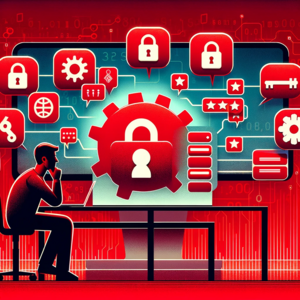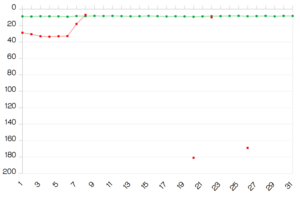How Chinese surveillance methods are going global.
Authoritarian countries - but also democracies - use surveillance technology from China.

China's surveillance
With a population of almost 1.5 billion China has more than 700 million surveillance cameras installed - that's almost one for every two citizens. And China is not done installing surveillance cameras, the number keeps rising. This system is set up to monitor every single person, be it Chinese national, or foreigner, and to identify the person through facial recognition.
Even worse, China is using its extreme surveillance methods to feed its social credit system - a system used to not only monitor citizens, but to also make them behave in a way the ruling class want them to.
China's social credit programs, first announced in 2014, collect and aggregate data on people's purchases, traffic violations, and social activities. And Chinese cities are the most heavily monitored in the world, with more cameras per square kilometer than anywhere else. These cameras are often equipped with facial recognition and computer visual analysis, which should make surveillance easier for the Chinese Communist Party.
The use of facial recognition technologies is spreading around the world, and investment in advanced image processing that can help extract meaningful data from camera images has also increased, particularly in China and Russia.
These methods, rooted in advanced technologies and an all-encompassing surveillance approach, have raised significant concerns about privacy, human rights, and the potential for authoritarian control.
But despite lots of criticism, this development is an ongoing trend - not only in China, but in many autocracies - that is unlikely to stop anytime soon for two reasons:
- Surveillance helps autocracies to control its citizens.
- In combination with the social credit system, people do not need to be forced to act in an "agreeable" way; they do so "voluntarily".
Global surveillance report
The same trend can also be seen on a global level. Every year, Freedom House, a nonprofit research and advocacy group for global democracy, publishes a report on the level of global freedom and internet freedom in 70 countries around the world. Particularly, the level of internet freedom has been declining since it is being tracked.
The countries are ranked on a number of factors, including privacy protections, censorship, and the obstacles each faces to free Internet access. Globally, the scores have dropped for 11 consecutive years, indicating that the world is generally moving away from an Internet that protects users' digital rights. None of the non-democratic countries were rated by Freedom House as having a "free" Internet, while all of the democratic countries were rated as either "free" or "partly free."
This trend culminated in the publication on the "rise of digital authoritarianism" by Freedom House.
The report stated: "Digital authoritarianism is understood as a way for governments to control their citizens through technology - turning the concept of the Internet as an engine of human freedom on its head."
In other words: The Internet is no longer used to increase freedom, but to limit freedom.
Digital authoritarianism destroys freedom
Countries that scored worst - China, Russia, Tajikistan, Uzbekistan, Kazakhstan, Kyrgyzstan, India, and Pakistan - are all part of Shanghai Cooperation Organization (SCO), an economic and political alliance led by the authoritarian regimes of China and Russia.
The scores of these authoritarian countries have fallen by an average of 10 points over the past decade. China ranked last on Freedom House's report card last year - as it has every year since 2014. And Iran, another authoritarian country, ranked second to last.
The decline in ranking is giving a clear statement: Authoritarian countries around the world are using technology to further oppress their citizens.
The promise of increased freedom through digitalization has led to digital authoritarianism.
Exporting its monitoring methods
China's influence on digital authoritarianism can hardly be overestimated: By building the perfect surveillance state, the country demonstrates that its technically possible - and affordable - to monitor its own citizens constantly.
China's surveillance prowess can be attributed to its development of cutting-edge technologies such as facial recognition, artificial intelligence, and big data analytics. The country's extensive domestic surveillance system, exemplified by the use of CCTV cameras in public spaces, facial recognition software and the Chinese social credit system, serves as a model for other nations looking to bolster security measures.
Following China's lead, research shows that the majority of authoritarian countries are rapidly moving toward more digital human rights abuses by expanding mass technical surveillance of citizens, censorship on the Internet, and control of individual expression that computers and big data help them with. Technological trade relations among authoritarian countries around the world - both OSCE members and their allies - are visibly deepening. And, these states have each begun to use similar rules of the game for digitally-enabled social control. They are copying from each other.
China's technology - hardware and software - help autocrats around the world to monitor their own citizens.
Dangers of Chinese surveillance methods going global
1 Erosion of Privacy: The expansion of Chinese surveillance methods lead to an erosion of privacy rights in the countries adopting these technologies. Widespread surveillance undermines personal freedoms and create a culture of fear, stopping people to express dissenting opinions or engage in political activism.
Human Rights Concerns: China's surveillance apparatus is often criticized for its role in suppressing ethnic minorities, such as the Uighurs in Xinjiang. When Chinese companies export these technologies, there is a risk that they will be used by repressive regimes to monitor and control their own populations, exacerbating human rights abuses.
Dependence on China: As nations become reliant on Chinese surveillance technologies, they may find themselves vulnerable to political leverage and manipulation by the Chinese government. The dependence on these technologies can potentially compromise a country's sovereignty and independence.
Technological Backdoors: Concerns have been raised about the potential for hidden backdoors and vulnerabilities in Chinese surveillance systems, which could be exploited for cyber-espionage or sabotage by the Chinese state or other malicious actors.
Absolute control
There is a strong correlation between systems of government and their respective levels of digital rights, with authoritarian regimes more inclined than democratic regimes to use technology as a method for social control.
But unfortunately today also democracies use surveillance technology on a large scale. The United States and the United Kingdom are two countries that use massive camera surveillance, for example, which ironically comes primarily from China.
While democracies turn towards more surveillance, they do not (yet) use these methods to also limit the freedom of their citizens - at least in most democratic countries.
Autocrats, however, also take the next step: It is widely known that Russia blocks access to encrypted services like Tutanota, but even the democracy of India recently banned encrypted chat apps allegedly to fight terrorism.
These blocks are a sign that digital authoritarianism goes beyond software and hardware. More broadly, it is about how the state can use technology to increase its control over citizens.
Internet blackouts caused by state actors, for example, have increased every year for the past decade. A state's ability to shut down the Internet is tied to the extent of its ownership of Internet infrastructure, a hallmark of authoritarian regimes like China and Russia. And the more important the Internet becomes to all aspects of life, the more such blackouts can contribute to destabilization and harm to people.
By monitoring and controlling the Internet, these countries try to control what information their citizens can access and share. The goal is to control the people and stop political opposition or even an uprising of the people against their autocratic governments.
And there is little to stop the further spread of these surveillance methods.
As worrisome as this sounds, it is even more reason to fight for privacy and freedom of speech wherever we can.
While technology is being used to oppress people, it can also be used to liberate them.
Free encrypted tools like the chat app Signal and the encrypted email service Tutanota help activists around the world to protect their private communication. Keeping messages confidential can be a matter of life and death for activists, journalists and whistleblowers in many countries.
That's why we at Tutanota will keep fighting for privacy and against and attempt to backdoor encryption.
 Privacy matters. That's why we must fight for encryption.
Privacy matters. That's why we must fight for encryption.











